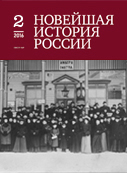Формирование и боевой путь интернационального партизанского отряда им. К. Е. Ворошилова. 1942–1943 гг.
The Formation and the Battle Path of the K. E. Voroshilov International Guerrilla Detachment. 1942–1943
Author(s): S. B. VyazmenskiySubject(s): History
Published by: Издательство Исторического факультета СПбГУ
Keywords: international partisan detachment named after K. E. Voroshilov; Francisco Gullón; the Leningrad headquarters of the partisan movement
Summary/Abstract: The article is devoted to the clarification of the tragic fate and perpetuation of the memory of international partisan detachment named after K. E. Voroshilov commanded by the Spanish anti-fascist, the captain of the Red army Francisco Gullón. The detachment was formed by order № 0038 commander in chief of the guerrilla movement K. E. Voroshilov dated September 14, 1942. And was supposed to operate behind enemy lines in the area of Siverskaya—Luga—Batetskaya. 32 Spanish commandos experienced in subversive struggle during the Civil war in Spain (1936–1939) fought shoulder to shoulder with the Soviet warriors in this unit. Because of the weak qualification of pilots guerrillas landing occurred with a range of 80-100 km. In addition, two of the three detachment groups (a total of more than 70 people) shortly after landing behind enemy lines were missing. As a result only one group of the unit - under the command of F. Gullón — remained combat-ready. The group acted on the territory of the Kingisepp and Luga districts of the Leningrad region from September 29, 1942 to March 6, 1943. But only 4 guerrillas of the 55 partisans of F. Gullón group emerged in the Soviet rear on March 20, 1943. The partisans had to fight not only a superior number of the German punitive expeditions, but with a strong frost, hunger, diseases, and even the suspicion of treachery. Nevertheless the guerrillas continued to carry out sabotage on the enemy’s communications. The Leningrad headquarters of the partisan movement was well aware of the disastrous situation in the detachment, but did not take active action to correct it. Even after the suspect in the detachment’s activity for the Germans was not confirmed.
Journal: Новейшая история России
- Issue Year: 6/2016
- Issue No: 16
- Page Range: 68-82
- Page Count: 15
- Language: Russian

